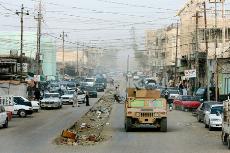Clean water, Internet coming soon to Fallujah

A US military humvee patrols a main street covered with a canopy of electrical wires at the site of the largest U.S. battle in Iraq 40 miles west of Baghdad, Iraq, in Fallujah, in this May 1 file photo. The Associated Press
Jul 12, 2006
Last updated on May 12, 2016 at 03:38 a.m.
FALLUJAH, Iraq – Clean water should flow to 80 percent of Fallujah’s homes this fall, and by summer’s end a planned wireless network will provide phone service and Internet access to thousands, a technological leap unimaginable just months ago.
But mounds of rubble litter the city, electricity is available only four hours a day, and an estimated 50,000 people out of a population of about 300,000 still have not returned 18 months after Fallujah was destroyed in an American assault to wrest control from insurgents.
Progress is mixed in Fallujah, the symbol of anti-American resistance until U.S. troops barreled through the city in November 2004 in the most intense urban combat of the Iraq war.
Improvements have come, but slower than expected and on a smaller scale than planned.
Get The Daily Illini in your inbox!
City officials are still asking for more money to pay laborers to haul away seemingly endless piles of rubble. Still, U.S. officials say substantial advancements will become apparent this fall to the residents who have returned.
“By the end of the year, that’s when we’ll see the turnaround,” said Maj. Angel Ortiz of San Pedro, Calif., who oversees projects in the area for the U.S. Army Corps of Engineers. “After all these years of planning, that’s when it’s going to pay off in their eyes.”
Officials are eagerly looking forward to the completion of a multimillion-dollar water treatment project they say will deliver clean water to 80 percent of Fallujah’s homes.
By the end of September, officials say an $8 million wireless telecommunications project could activate 15,000 phone lines in the city. New, modern handsets will then be handed out to families that once had phones lines.
“This phone service will come with Internet. You can stick an ethernet cord in the back of the phone and voila,” said Lt. Col. Carl Friedrich of Washington, D.C. If the project works, it could be extended to other cities in western Iraq.
Overall, $192 million has been allocated to more than 100 complete or ongoing projects in the Fallujah area, Ortiz said. An additional $50 million dollars in projects is also expected to be approved. About 90 percent of projects have experienced delays, Ortiz said.
“The problem with this program is that you don’t see progress until they’re complete. It’s hard for the average citizen to appreciate the programs until they have drinking water, electricity,” said Capt. Richard Donnelly of Atlanta, a Marine who helps manage reconstruction projects.
Tens of millions of dollars have also been allocated to projects whose impact won’t be immediately obvious. Though over $30 million has been spent on the city’s electricity grid, Ortiz said, available wattage may not increase because there aren’t enough power plants.
U.S. officials have proposed at least another $30 million to improve the distribution system – but none of it to build more power plants, meaning power levels will remain stagnant.
“The number one need is electricity. All other projects come after this. The electricity that we have now is not enough,” said Najim Abdullah, chairman of the Fallujah City Council.





